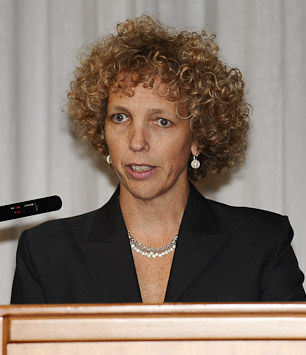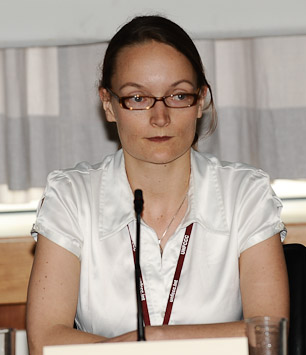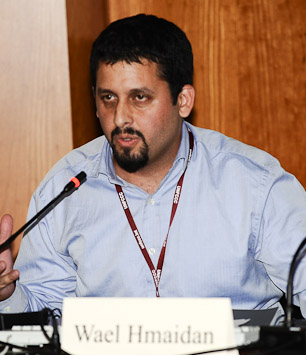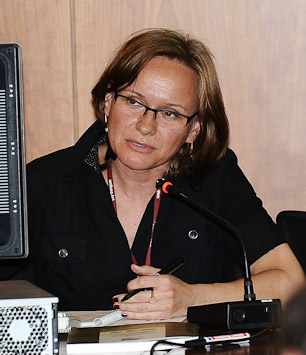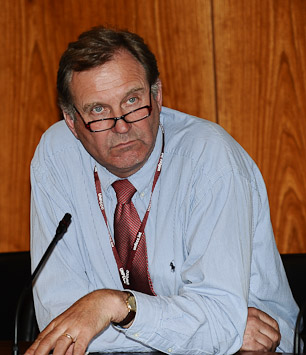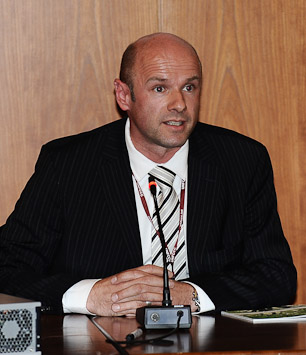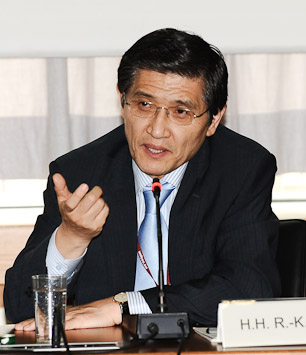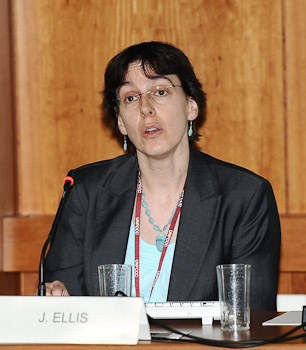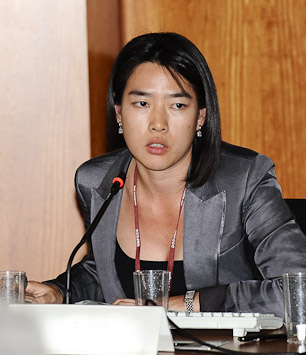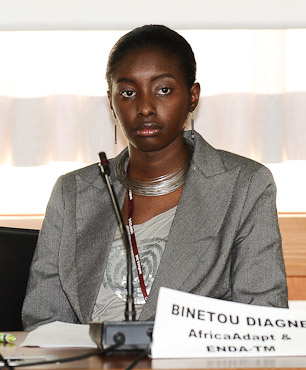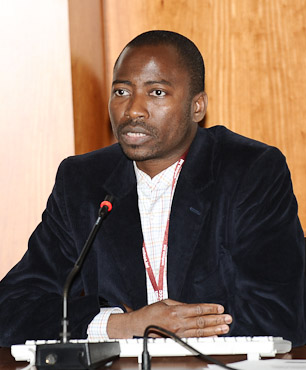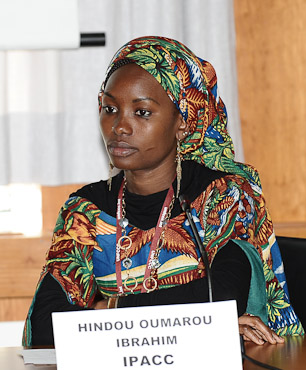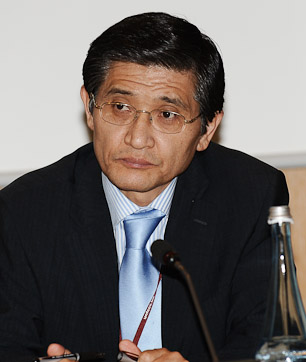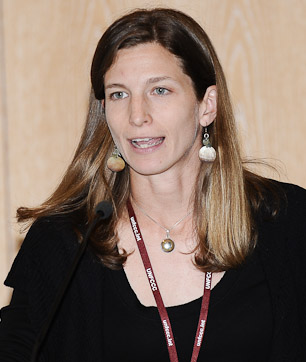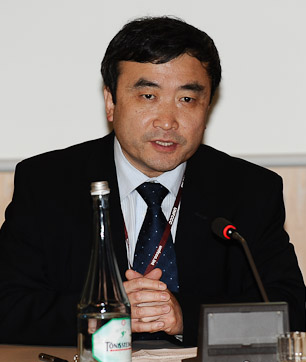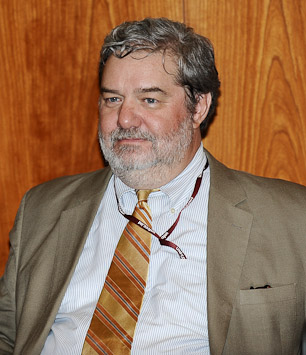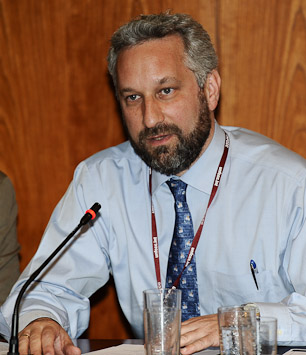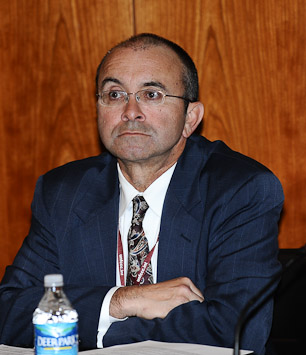 |
A Special Report on Selected Side Events at the 1-12 June 2009 Bonn, Germany |
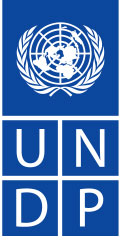 |
| Daily Web Coverage and Reports | ||||||||||||||||||||||||
| 1 June | 2 June | 3 June | 4 June | 5 June | 6 June | 8 June | 9 June | 10 June | 11 June | 12 June | ||||||||||||||
| HTML | ||||||||||||||||||||||||
Events on Monday, 8 June 2009
A Copenhagen Climate Treaty: A Proposal for a Copenhagen Agreement by Members of the NGO Community
Presented by WWF
This event constituted the official release of a proposed draft post-2012 agreement developed by a group of NGOs. Jennifer Morgan, Third Generation Environmentalism, introduced the proposal, noting it envisions a new protocol to the UNFCCC as well as amendments to the Kyoto Protocol. She stressed the draft agreement “has something for everyone,” and listed: ambitious targets; substantial funding; a carbon market; technology transfer mechanisms; “zero carbon action plans” in developed countries; “low carbon action plans” in developing countries; an adaptation framework; and a strong compliance system.
Kaisa Kosonen, Greenpeace, presented proposed commitments by industrialized countries, namely, emission reductions of at least 23% by 2013-2017, 40% by 2020 and 95% by 2050. She highlighted other elements of the agreement, including, inter alia: US$160 billion annually from public sources in developed countries for policy implementation in developing countries; differentiation between Parties based on GDP per capita with a threshold for classification as a “developed country” of US$20,000; and financial penalties for non-compliance.
Tasneem Essop, WWF, presented the developing countries package. She said developing countries should aim to contain their emissions to 87% above 1990 levels by 2020 and 51% above 1990 levels by 2050. She elaborated on: MRV mechanisms, including national communications and GHG inventories; unilateral NAMAs without international support that are reported through existing mechanisms and evaluated by independent experts; and a NAMA registry.
Christoph Bals, Germanwatch, described proposed international institutional arrangements, including: a “Copenhagen climate facility” for finance and technology transfer that consists of advisory boards and an executive committee that makes decisions; a new carbon market regulatory authority on credited mitigation actions; climate risk insurance mechanisms; and a compensation mechanism. He said an international adaptation network would rely on regular and predictable funding and prioritize the most vulnerable communities within every country.
Wael Hmaidan, Indyact, Lebanon, suggested that all Parties to the Convention re-evaluate targets on the basis of the forthcoming IPCC Fifth Assessment Report and an emergency science review clause. He said: an ambitious and equitable deal is possible; the most responsible and capable Parties must take leadership; finance, technology and capacity building are critical; and all countries need to develop long-term strategies.
 |
| L-R:Wael Hmaidan, Indyact, Lebanon; Jennifer Morgan, Third Generation Environmentalism;Christoph Bals, Germanwatch Kaisa Kosonen, Greenpeace; and Tasneem Essop, WWF |
|
|
Sustainable Forest Management and Climate Change – Approaches to Mitigation and Adaptation
Presented by Norway and the MCPFE
This panel presented and discussed tools for sustainable forest management, the impact of climate change on forests and the role that forest owners can play in mitigation.
Malgorzata Buzsko-Briggs, Ministerial Conference on the Protection of Forests in Europe (MCPFE) Liaison Office, Norway, explained that the MCPFE is a voluntary and participatory regional policy process that aims to facilitate sustainable management in European forests. She explained that the MCPFE defines sustainable forest management (SFM) in a way that incorporates concepts of forest biodiversity protection, reforestation, afforestation and restoration.
Alexander Buck, International Union of Forest Research Organizations (IUFRO), Austria, discussed climate change impacts on forests, implications for human well-being and options for forest adaptation. He highlighted, inter alia, that: mitigation and adaption are closely linked; successful mitigation requires that forests retain their capacity to adapt to climate change; large reductions in emissions and deforestation are needed to preserve the adaptive capacity of forests; and SFM can help reduce forest vulnerability to climate change.
Christer Segerstéen, European Confederation of Forest Owners, stressed that forest owners can play an important role in climate change mitigation. He stressed that forest owners should simultaneously grow forests and use forests but do so in a sustainable manner.
Participants discussed, inter alia: methodologies employed by the MCPFE in a recent report; the role of logging in SFM; the role of plantations in forest owners’ definition of “forests”; the need to prevent SFM from serving as a permit for logging companies to cut down forests in Indonesia; and the need for a common definition of SFM.
 |
| L-R: Christer Segerstéen, European Confederation of Forest Owners; Alexander Buck, IUFRO; Malgorzata Buzsko-Briggs, MCPFE Liaison Office, Norway; and Knut Øistad, Norway |
|
|
Building Bridges: NAMAs, Registries and Mitigation Support
Presented by the OECD
This event presented the OECD’s research on NAMAs and registries, and discussed relevant perspectives from non-Annex I and Annex I delegations.
Jane Ellis, OECD, outlined different approaches to elaborating NAMAs and MRV actions and support. She noted that sectoral approaches can lead to double counting or gaps in measuring emission reductions. Ellis said a registry could be a useful tool to recognize or quantify GHG mitigation actions.
Joy Kim, OECD, discussed how to link NAMAs with necessary support. She outlined possible eligibility criteria for financial support, including: consistency of the mitigation action with relevant national development plans; and ability to leverage finance towards GHG-friendly investments.
Jürgen Lefevere, EC, said NAMAs and MRVs should require three information types, namely: atmospheric impacts; effectiveness of financial, technological and capacity-building support; and policy impacts. He said NAMAs should be seen within a broader context of low-carbon development strategies.
Amb. Rae Kwon Chung, the Republic of Korea, proposed a registry in which developing countries voluntarily pledge unilateral actions. He said these actions could then be implemented in a domestically binding manner and verified using an international mechanism for transparency, not penalization, purposes. He stressed that this would provide developing countries the opportunity for international recognition of domestic actions.
Robert Owen-Jones, Australia, outlined his country’s proposal that all countries develop national mitigation schedules. He said registries and low-carbon development strategies could be valuable components of an overall approach, but noted the challenge of drawing together these different elements.
Aysar Tayeb, Saudi Arabia, described a proposal whereby countries would submit NAMA pledges to a “pool” in which they are first evaluated without attribution and second by geographical location to achieve balance. He said pledges could then follow either a “supported” or an “accredited” implementation pathway.
Participants discussed a need for a manual on low-carbon development.
 |
| L-R: Aysar Tayeb, Saudi Arabia; Jane Ellis, OECD; Dagmar Droogsma, UK; Joy Kim, OECD; Amb. Rae Kwon Chung, the Republic of Korea; Jürgen Lefevere, EC; and Robert Owen-Jones, Australia |
|
|
Strengthening Knowledge Sharing on Climate Change Adaptation in Africa
Presented by Institute of Development Studies
This event showcased innovative approaches to mixing traditional knowledge and modern tools for local-level climate change adaptation.
Xianfu Lu, UNFCCC Secretariat, said adaptation is multi-scalar and multi-temporal, has multiple drivers and stakeholders, and requires decision making under uncertainty. She described the role of knowledge brokers in synthesizing knowledge from indigenous peoples, academics and scientific centers into useful knowledge tools. She highlighted initiatives under the Nairobi Work Programme to enhance decision-making capacity on adaptation.
Moussa Na Abou Mamouda, Environment and Development in the Third World (ENDA-TM), stressed that valuable traditional knowledge exists but is poorly shared. He said researchers play a key role in relaying information between vulnerable communities and decision makers. He highlighted constraints that African researchers face, including access to affordable data.
Hindou Oumarou Ibrahim, Indigenous Peoples of Africa Co-ordinating Committee, underscored the utility of community mapping tools for mobile indigenous communities in Africa. She described how communities use three-dimensional mapping, CyberTracker, related GPS data-based technology and Google Earth to: map untitled lands; show how local communities are coping with climate instability; and plan for future climate change impacts.
Binetou Diagne, ENDA-TM, highlighted challenges faced by knowledge-sharing intermediaries, including: overcoming linguistic and regional barriers; accessing local knowledge; and delivering pertinent information. She introduced the AfricaAdapt Knowledge Sharing Innovation Fund, which offers grants of up to US$10,000 for innovative tools, such as songs, theatre, and video, to share knowledge on adaptation amongst marginal and hard-to-reach communities.
Participants discussed, inter alia: the potential for radio and Web 2.0 technologies for sharing information about adaptation; the potential for knowledge-sharing networks to threaten the roles of traditional knowledge holders in local communities; the need for knowledge networks to safeguard the intellectual property rights of indigenous peoples; and means to address urgent adaptation needs given slow implementation of NAPAs.
|
|
Unlocking a Global Deal: Taking MRV from Concept to Practice
Presented by the World Resources Institute (WRI)
This event considered institutional arrangements for an MRV framework. Taryn Fransen, WRI, noted the lack of clarity in the Bali Action Plan on definitions and functions of measurable, reportable and verifiable (MRV) processes. She presented analyses of national climate change plans in Mexico, Brazil, South Africa, China and India, and recommended, inter alia: standardized reporting and verification procedures; the use of Annex I inventory processes for all developed countries, including non-Parties; GHG inventories for developing countries with significant emissions; low-carbon development strategy formulation; annual reports; periodic reviews; and the use of an international registry to recognize NAMAs.
Zou Ji, Renmin University, China, said MRV should be a vehicle for facilitating UNFCCC implementation and contributing to further actions. He stressed the need to develop methodologies for MRV related to technology transfer, recommended making full use of existing international reporting systems in the UNFCCC process and said MRV is an evolving, dynamic process that requires capacity building.
Amb. Rae Kwon Chung, the Republic of Korea, noted challenges in creating databases and inventories in developing countries and emphasized the importance of capacity building. He cautioned against the use of MRV to impose legally-binding commitments on developing countries and stressed that the main function of MRV should be to provide transparency.
Jane Ellis, OECD, noted differences between existing national communication processes for Annex I and non-Annex I countries. She said it is not necessary to require all countries to submit inventories and noted the need for particularly rigorous and reliable assessment of NAMAs if they create emission credits.
During discussions, panelists addressed: the need to include all GHGs in MRV activities; lack of funding; and the need for capacity building.
 |
| L-R: Zou Ji, Renmin University, China; Rae Kwon Chung, the Republic of Korea; Jane Ellis, OECD; and Rob Bradley, WRI |
|
|
Update on U.S. Climate Change Policy
Presented by the Pew Center on Global Climate Change
This event was organized to update participants on the latest on cap-and-trade legislation and federal regulatory actions, and the implications of these actions for the ongoing international climate negotiations.
Manik Roy, Pew Center, discussed the state-of-play in US domestic climate change policy, highlighting the proposed Waxman-Markey Bill. He detailed the Bill’s provisions, including that it will: cover 85% of US GHG emissions under a cap-and-trade programme; and reduce emissions by 17% below 2005 levels by 2020 and 83% by 2050.
Roy noted some international provisions of the proposed Bill, including that 5% of the allowance value would be set aside for reduced deforestation and 1% for adaptation and clean technology.
Leif Hockstad, US, summarized the latest climate change developments within the US Environmental Protection Agency (EPA), explaining that these actions are those that the EPA can do with existing regulatory authority. He detailed a number of climate change-related proposals on: mandatory GHG reporting; carbon capture and storage (CCS); a national passenger vehicle programme; “endangerment findings” under the US Clean Air Act; and renewable fuel standards.
Hockstad highlighted that the CCS proposal involves evaluating risks to human health and developing regulatory frameworks. On the national passenger vehicle programme, he explained that it would require a 5% annual increase in fuel economy and fleet-wide averages of 35.5 miles per gallon by 2016.
Mark Helmke, US, highlighted uncertainties that US negotiators may face at the 2009 Copenhagen climate change talks if the Waxman-Markey Bill does not pass through the Senate prior to the meeting. He said US negotiators in Copenhagen would be negotiating an implementing agreement to the UNFCCC that could be filled out with national plans at a later date.
Helmke suggested they were looking for an agreement that would include emission reductions for Annex I and non-Annex I countries as well as funding for mitigation and adaptation. He added that the US administration is looking to actively engage China, including through a “strong” bilateral agreement that could help to overcome “logjams” in international negotiations.
Participants discussed, inter alia: the likelihood that the allowance value for reduced deforestation will remain in the Waxman-Markey Bill; the inadequacy of proposed finance streams for international adaptation and clean technology under the Bill; and the possibility for flexibility in the emission reduction targets outlined in the Bill.
Participants also discussed: the expected likelihood of excluding the CDM from a US cap-and-trade system; the role of catastrophic catalytic events in shifting public opinion; the implications of US-China relations to international climate change politics; the possibility of the US and China jointly taking a leadership role on climate change; the role of agriculture and soil conservation in sequestering carbon; and the evolution of the US debate on border tax adjustments.
|
|
| Daily Web Coverage and Reports | ||||||||||||||||||||||||
| 1 June | 2 June | 3 June | 4 June | 5 June | 6 June | 8 June | 9 June | 10 June | 11 June | 12 June | ||||||||||||||
| HTML | ||||||||||||||||||||||||
Digimarc and the Digimarc logo are registered trademarks of Digimarc Corporation. The "Digimarc Digital Watermarking" Web Button is a trademark of Digimarc Corporation, used with permission.
Please e-mail the Digital Editor should you have any questions regarding the content of this page.
| Back to IISD RS "Linkages" home | Visit IISDnet | Send e-mail to ENB |
© 2009, IISD. All rights reserved.

